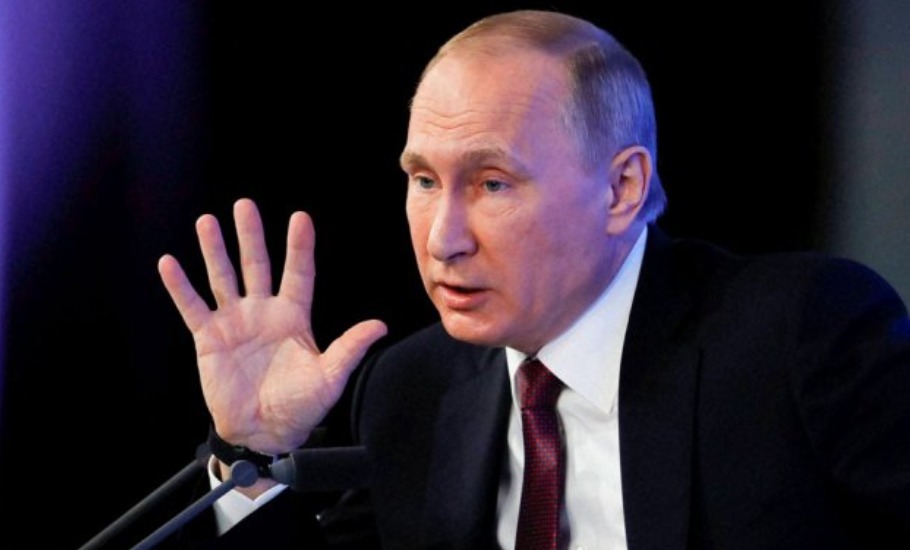
What are war crimes? Is Vladimir Putin a war criminal? Who decides?
The concept of war crimes is a recent one; before World War II, it was accepted that the horrors of war were part of the nature of war

Russia’s invasion of Ukraine has led to calls in the US, UK and Europe to hold Russian President Vladimir Putin and his subordinates accountable. US President Joe Biden called Putin a war criminal on March 16 as news emerged that a theatre and swimming pool compound sheltering hundreds of civilians in Mariupol had been hit. The International Criminal Court has already opened an investigation into war crimes in Ukraine.
Who is a war criminal?
The concept of war crimes is a recent one. Before the Second World War, it was generally accepted that the horrors of war were part of the nature of war. Attitudes changed following the Holocaust perpetrated by Nazi Germany, and the mistreatment of both civilians and prisoners of war by the Japanese in WW2.
Today the term “war criminal” applies to anyone who violates a set of rules known as the law of armed conflict, which governs how countries behave in times of war.
Also see: Full coverage of the war in Ukraine
Those rules, modified and expanded over the past century, were drawn from the Geneva conventions in the aftermath of the Second World War. Protocols were added later. The rules aim to protect people not taking part in fighting and those who can no longer fight (doctors and nurses, prisoners of war, for example). Treaties and protocols lay out who can be targeted and with what weapons. They also prohibit certain weapons, including chemical or biological agents.
What actions constitute war crimes?
As defined by the International Criminal Court (ICC) in the Hague, war crimes include wilful killing, torture, rape, forced prostitution, hostage taking, using human shields, using starvation as a weapon and shooting combatants who’ve surrendered, among many other acts. They can also include using banned weapons, deliberately attacking civilians and non-military targets, including hospitals.
The ICC also prosecutes crimes against humanity committed in the context of “a widespread or systematic attack directed against any civilian population”.
Four routes to justice
Generally, there are four paths to investigate and determine war crimes. One is through the ICC.
Second is through the UN. The world body can turn its work on the inquiry commission over to a hybrid international war crimes tribunal to prosecute Putin.
A third option is for interested parties –the NATO, the EU, for example – to form a tribunal or court to try Putin. The military tribunals at Nuremberg against Nazi leaders are an example.
Finally, some countries have their own laws for prosecuting war crimes. Germany, for example, is already investigating Putin. The US does not have such a law, but the justice department has a section that focuses on acts including international genocide.
Where might Putin be put on trial?
It is not clear. Russia does not recognise the ICC’s jurisdiction, neither does the US. Putin could be tried in a country chosen by the UN or by a consortium of concerned countries. But that will be a long shot.
Realistically, what are the chances of trying Russian leaders?
Not good. The ICC doesn’t permit trials in absentia, and the court has no police force to enforce its warrants. It relies on its member states to make arrests. But they haven’t always respected their obligations. And the accused could always avoid travelling to any country that might turn them over.
The ICC has mainly been able to prosecute war crimes in cases where the accused was on the losing side of a conflict and was turned in by the winning side. It has never been able to indict a sitting head of state. In 2011, the ICC issued a warrant for Laurent Gbagbo, former president of the Ivory Coast, for four counts of crimes against humanity committed in 2010 and 2011. He was transferred to the Hague the same year. His trial started in 2016 and he was acquitted three years later.
Sudan’s Omar Al Bashir was the first sitting head of state to be issued with an ICC arrest warrant. Since 2009, he has been wanted for crimes against humanity, war crimes and genocide in Darfur in Sudan. In 2020, Sudan’s ruling military council agreed to hand him over to the ICC. However, the Sudanese government has now agreed to set up a special court on war crimes in Sudan, and the scope of the court’s investigation would include Bashir. In 2011, the ICC issued an arrest warrant for the leader of Libya, Muammar Gaddafi. He was murdered before he could face trial.
Leaders to have been prosecuted in the past
From the tribunal in Nuremberg to more recent hearings, leaders have been prosecuted for their actions in countries including Bosnia, Cambodia and Rwanda.
Former Yugoslav leader Slobodan Milosovic was put on trial by a UN tribunal in The Hague for war crimes. He died in his cell before the court could reach a verdict. His Bosnian Serb ally Radovan Karadžić and the Bosnian Serb military leader, Gen Ratko Mladić, were successfully prosecuted and are serving life sentences.
The former Liberian president Charles Taylor was sentenced to 50 years after being convicted of sponsoring atrocities in neighbouring Sierra Leone. Chad’s former dictator Hissène Habré, who died last year, was the first former head of state to be convicted of crimes against humanity by an African court. He was sentenced to life.

